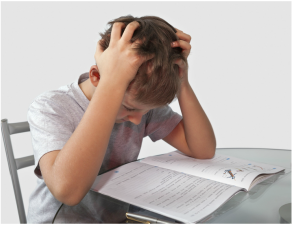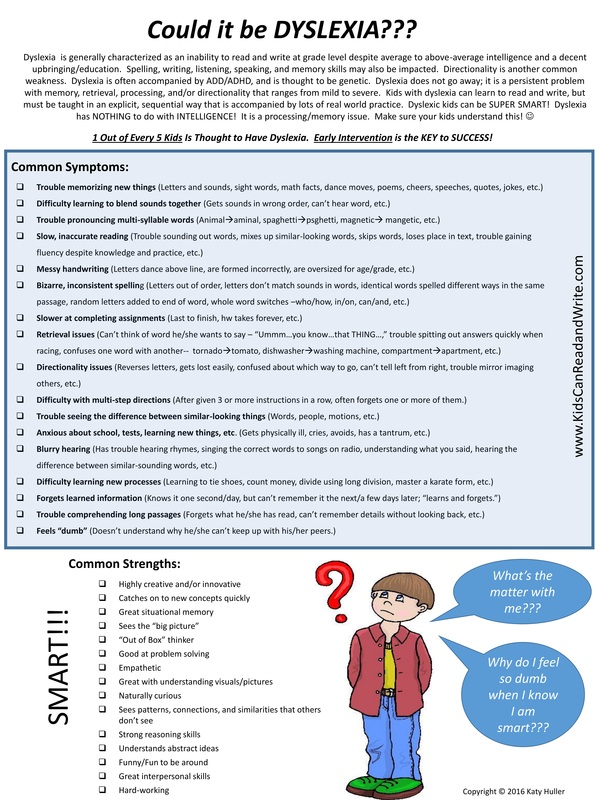Could it be DYSLEXIA?

Dyslexia is generally characterized as an inability to read and write at grade level despite average to above-average intelligence and a decent upbringing/education. Spelling, writing, listening, speaking, and memory skills may also be impacted. Directionality (trouble distinguishing between right and left, difficulty finding way around new places, tendency to reverse and/or confuse letters like b/d/p/q) is another common weakness. Dyslexia is often accompanied by ADD/ADHD, and is thought to be genetic. Dyslexia does not go away; it is a persistent problem with memory, retrieval, processing, and/or directionality that ranges from mild to severe. Dyslexic kids often struggle to learn and/or correctly identify sight words. This confusion often leads to miscalling similar-looking words when they are reading. They often struggle with learning to spell correctly, too, especially when they try to do so by memory rather than by sound. Kids with dyslexia can learn to read and write, but must be taught in an explicit, sequential way that is accompanied by lots of real world practice. To retain what they have learned, most dyslexics must continue to USE the skills they have learned; otherwise, they are easily forgotten.
My kid is too smart to be dyslexic! Dyslexic kids can be extremely SMART! Dyslexia has NOTHING to do with INTELLIGENCE! It seems to be more of a processing/memory issue -- NOT a thinking/creative issue. Make sure your kids understand this! You can be dyslexic and still be very, very smart! You can also have dyslexia and still be super-successful at many things! In fact, there are many famous dyslexics who have made a HUGE impact on this world through their dyslexic "superpowers" -- Steve Jobs, Steven Spielberg, Tom Cruise, EINSTEIN, etc. Go to http://dyslexia.yale.edu/successfuldyslexics.html for a nice list of other dyslexics who have made an impact in all sorts of fields and vocations! Don't wait to get help! If you think your child may have dyslexia, get help ASAP from a qualified teacher, school, or tutor, and don't forget to allow your child the time he or she needs to discover his or her superpowers along the way! A good phonics program and a lot of hard work CAN get your kids reading and writing! Common Signs of Dyslexia
|
|
|
Does this sound like your child?
Your child does not have to have all of these symptoms to be dyslexic. If you strongly agree with two or more of the categories above, or find yourself checking off multiple boxes below, however, you might want to have your child officially tested by an educational psychiatrist to see if you can either get an official diagnosis or rule it out completely. Don't forget to thoroughly check your child's vision and hearing as well, as sometimes issues with these can cause dyslexic-like symptoms. When you check your child's vision, make sure to check for possible convergence issues as well as acuity. When you check your child's hearing, make sure to check to see if they are hearing CLEARLY as well as if they have any trouble hearing/focusing on sound when multiple sounds are competing for their attention.
What You Can Do To Help
If your child has dyslexia (or any other learning disability that has similar symptoms), it's important to remember that he or she can't help his or her memory, retrieval, processing, directionality, or comprehension issues. No amount of shame, teasing, or urging can make someone who has forgotten something (or who doesn't understand something) suddenly "remember" it or "get" it. When your child says that he or she doesn't know or understand something, believe him or her -- no matter how simple it seems or how sure you are that they "know" it because they knew it before. With dyslexia or other learning disabilities that affect the memory, it really doesn't matter if one "knew" it before. Whatever isn't constantly used, often slips away until the brain is reminded of it once more. So, be patient. Try to understand. Repeat yourself as often as needed, looking for simpler and simpler ways to explain whatever is difficult. Come up with mnemonic devices, songs, funny stories, visual cues, etc. to help your child remember things. Most of all, support your child in every way you can, helping him or her find his or her personal greatness along the way. It is bound to be frustrating, depressing, and even maddening at times, so if you need to, pretend you are working with someone else's child, and reach deep into your well of patience and understanding...or get someone else to help. Your child's inner soul depends on it.
Quick Tips:
- Help your child UNDERSTAND whatever it is you want them to know. Once he or she understands it, he or she is more likely to remember it/ be able to figure it out again and again. (Teach how to sound out words, figure out math facts, etc.)
- Use mnemonic devices to help remember important information that must be memorized. (To remember North, East, South, West --> Never Eat Soggy Waffles, etc.)
- Make sure your child understands what he or she is supposed to do BEFORE you leave your child to work on his or her own. Watch him or her do a few problems before you walk away to do other things. Reexplain the directions and/or concept being covered as many times as needed until your child understands what to do. Remain with your child until he or she is confident about completing the rest on his or her own.
- When giving directions, stick to one or two at a time. Once you hit three and four, it's possible that all will be forgotten! If your child can read, write them down!
- Let your child know about your struggles and how you have overcome them...or are still overcoming them. Let them know that everyone struggles with something, and that the important part is learning to persevere through the struggle. Help them to see that they are not "bad" or "dumb" or somehow "less than" others because they struggle.
- Help your child with whatever he or she struggles with, but make sure you create many opportunities for your child to shine as well. Don't take away his or her favorite things because of school troubles. It's important for your child to succeed and feel success in other activities so he or she can build a healthy sense of self amidst his or her struggles.
- Remind your child to work hard. Every day. Struggle does not mean quit. Struggle means to work harder. Explain to your child that it might not be "fair" that he or she has to come home and practice reading, writing, etc more than his or her classmates, but it's what he or she has to do to get good at it. Relate his or her struggles to some of your own. What do you have to work harder at to be good at? If you have memory problems as well, let your child know what you do to remember important things.
- To improve your child's spelling (if they can already read well and know all about letters, sounds, and the tricks), make sure you have him or her write every day. While he or she writes, help him or her hear the sounds in each misspelled word better so he or she can figure them out later on. Keep a list of the trickiest words that he or she needs to practice/memorize to learn, and go over them daily. Since spelling requires a lot of memory, it is usually harder than learning to read for severe dyslexics to grasp fully. Practice, practice, practice because whatever isn't used tends to slip away!
- If your child is a "guess reader," make sure you are constantly emphasizing the importance of starting on the left side of words, and reading each one part by part, watching for tricks, as he or she goes. "Guess reading" is a really hard habit to break once it gets started, and it requires a lot of hard work and persistence to replace with a better habit.
- Comprehension issues can often be helped by having your child "picture" whatever he or she is reading as he or she reads it. If your child can't "picture" the story because he or she is missing important background knowledge or vocabulary, you will need to fill in this missing information first!
- To help turn b's and d's around, help your child see which side he or she comes across first when reading-- b's start with the "bat" (see the stick on the side?) while d's start with the "daddy's (or doggy's) face" (draw a happy face in the circle showing a face!). When writing, simply write either the bat or the face first, depending on which letter you want, and keep going, putting whatever is left on the side that you are moving toward!
These are just a few tips to get you going! Hopefully I'll have time to add more soon! If you have any questions, feel free to email me!

